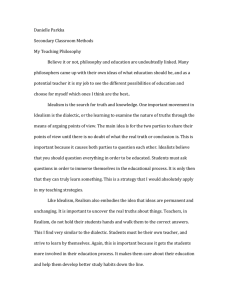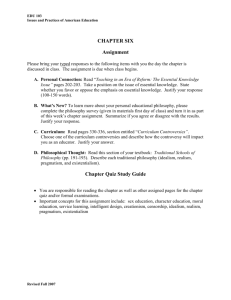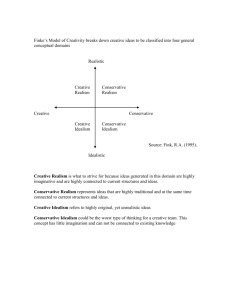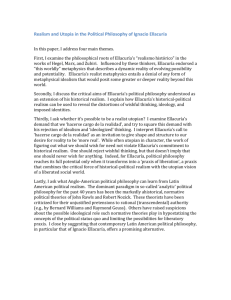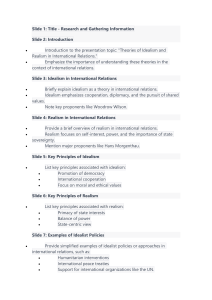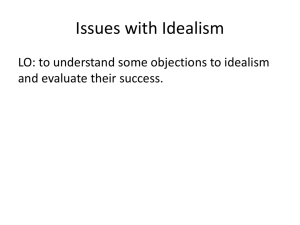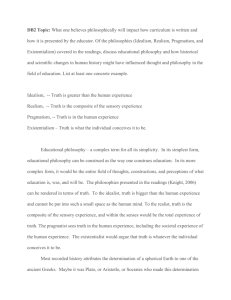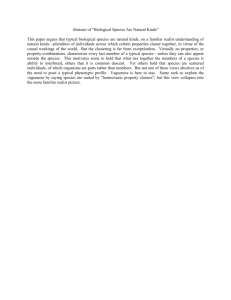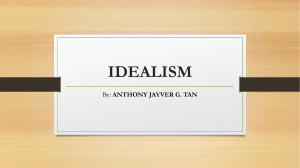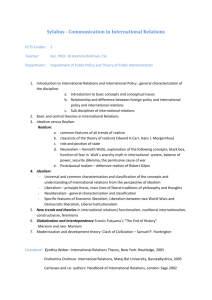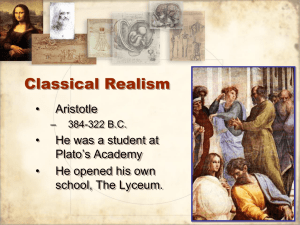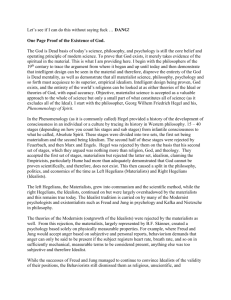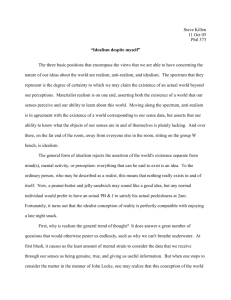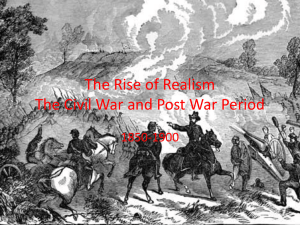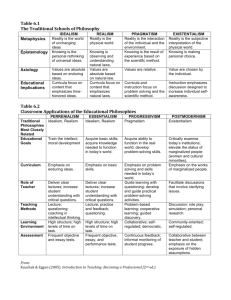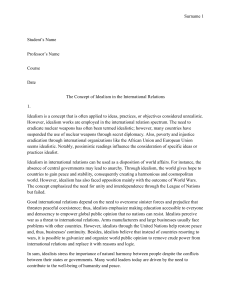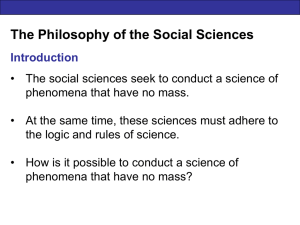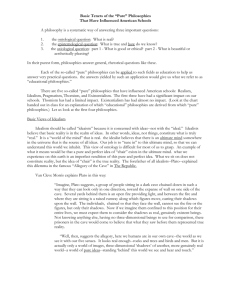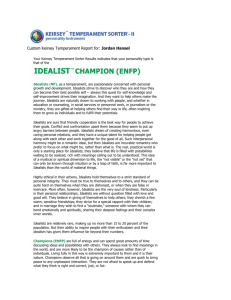Idealism and Realism
advertisement
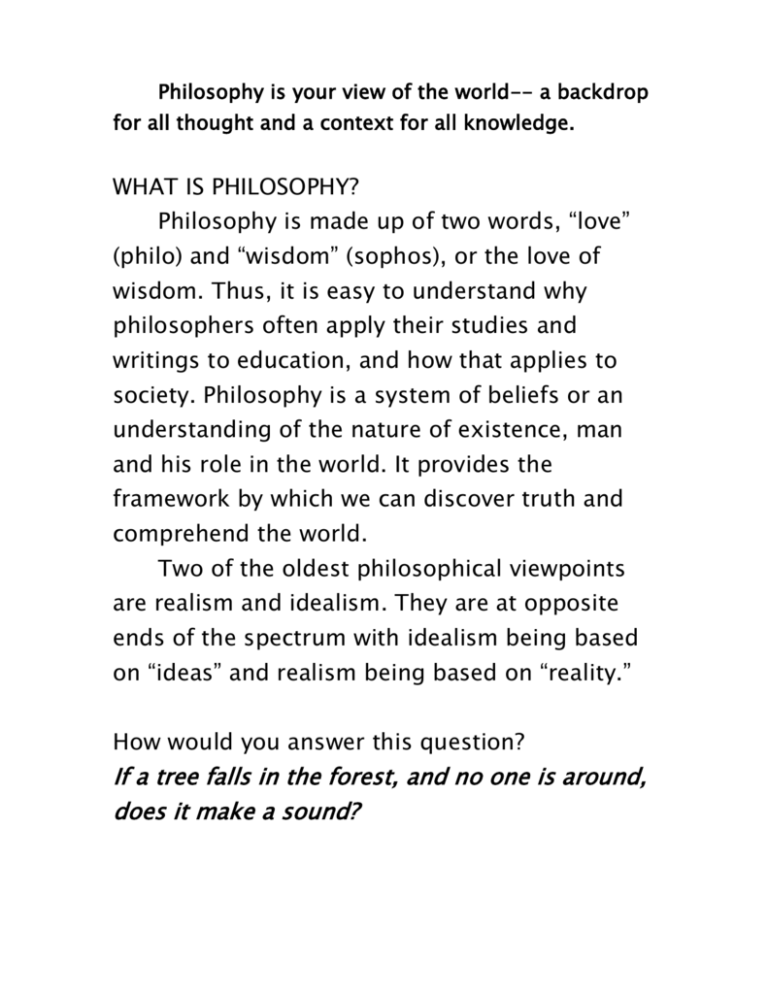
Philosophy is your view of the world-- a backdrop for all thought and a context for all knowledge. WHAT IS PHILOSOPHY? Philosophy is made up of two words, “love” (philo) and “wisdom” (sophos), or the love of wisdom. Thus, it is easy to understand why philosophers often apply their studies and writings to education, and how that applies to society. Philosophy is a system of beliefs or an understanding of the nature of existence, man and his role in the world. It provides the framework by which we can discover truth and comprehend the world. Two of the oldest philosophical viewpoints are realism and idealism. They are at opposite ends of the spectrum with idealism being based on “ideas” and realism being based on “reality.” How would you answer this question? If a tree falls in the forest, and no one is around, does it make a sound? REALISM A realist’s view is that reality exists whether man believes in it or not. In other words, natural scientific law is what is real, and that is unchanging. Truth is found in the logic and science of the physical world—the world that man can perceive with his five senses. SO, a realist would believe that the tree would make a sound because, naturally, there would be sound waves that would emit from the impact. It would not be logical to assume that the scientific principles that support sound waves would cease to exist just because no one was around to hear them. A realist would believe that destiny is predetermined by natural scientific law. Characteristics of a Realist: Relies on scientific principles and laws for answers Believes that the nature of man would be based on his evolutionary instincts A detail oriented person who doesn’t want to miss any important information. A person who relies more on logic than emotion Usually a person who would be more interested in solving someone’s problem than sympathizing with them about it A person who would be more likely to read the directions rather than figure it out on their own Skeptical, doubting Cares more about the rights of a community at large rather than the individual Not a risk taker Does not believe in a spiritual or intangible world (unless it could be scientifically proved) A rule follower Has a “every man for himself” attitude—survival of the fittest Is competitive—wants to win Doesn’t question the rules of concrete, natural scientific law, and tends to be less likely to rebel against traditions **Famous Realists : Wild, Aristotle IDEALISM Idealism is the view that all physical objects are dependent upon our perception of them, or that consciousness plays the primary role in constructing our world. Physical objects would not exist without our perception of them. Reality is unchanging, and all interconnected—all is one. Idealists believe that ideas are more important than the physical world around us. Truth is found in what we believe rather than what we perceive with our five senses. SO, an idealist would believe that the tree would not make a sound if no one was around to hear it since reality is based on perception. In fact, the extreme idealist would believe that if no one was around, the tree wouldn’t even exist. Idealists believe that man in in control of his own destiny, and that his destiny is based on choices he makes. Characteristics of an Idealist: Believes that man has free will A visionary Concerned more with the “big picture” rather than the details Has a “we’re all in this together” attitude—treat others how you would want to be treated More concerned with the rights of the individual rather than the community at large Goes with gut feelings, or intuition Optimistic Doesn’t like to follow directions or rules A risk taker Is cooperative rather than competitive—doesn’t care as much about winning Believes in a spiritual, or intangible world Can be a rebel—likes to question authority and uproot traditions **Famous Idealists – Thoreau, Emerson, Plato, Hegel, Froebel With which of these philosophies do you most identify? Do you have beliefs that you agree with on both sides? Most people are somewhere in between these two philosophies, but will lean toward one or the other.
